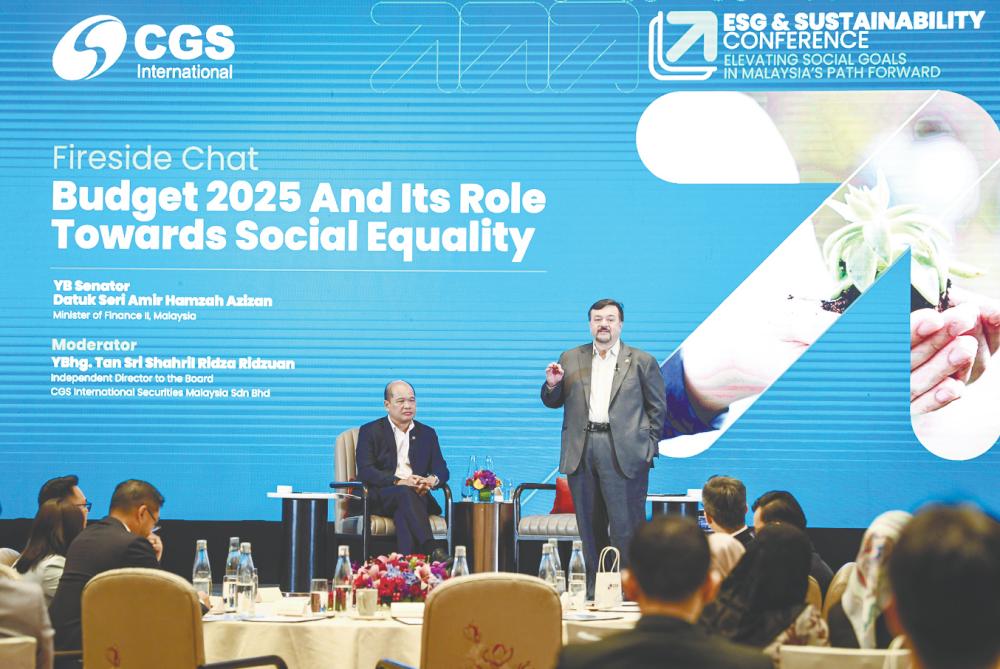KUALA LUMPUR: The government is focusing on Sales and Service Tax (SST) instead of reintroducing the Goods and Services Tax (GST) to stabilise the economy and meet the fiscal deficit target by 2028, said Minister of Finance II Amir Hamzah Azizan.
He explained that revenue measures implemented by the government should aim to quickly increase tax collection and not delay it.
“Our current state is that rolling out the GST system will take between 14 and 18 months. So for 14 to 18 months, there would be no additional income,“ Amir Hamzah said at the ESG and Sustainability Conference 2024, themed “Elevating Social Goals in Malaysia’s Path Forward”, hosted by CGS International Securities Malaysia today.
He said Malaysia needs to strike a balance between facilitating growth and creating wealth for the country while ensuring societal well-being is improved.
“While the GST system is a stronger tax system, the net effect on the bottom could be worse than a more progressive system,” he said. “The government needed to think through how to find this balance.”
Amir Hamzah highlighted the need for fiscal reform in the country within a short time frame, pointing to the commitment under the Fiscal Responsibility Act to achieve fiscal deficit targets by 2028.
“We have a commitment under the Fiscal Responsibility Act that by 2028, we will achieve the targets outlined, particularly the fiscal deficit-to-GDP ratio,” he said.
Currently, Malaysia has an SST regime, which Amir Hamzah said is easier to institutionalise compared to implementing a GST system. “By expanding the SST tax relief, we are able to widen its catchment, and it is much faster to institutionalise than rolling out the GST system.”
Amir Hamzah also addressed the government’s decision to increase the SST rate in March.
“The increase in SST this year … there are certain sectors where we provide support to ensure there is no ‘tax-on-tax’ mechanism. We have mechanisms in place to maintain SST tax relief for the logistics sector to avoid additional costs and reduce the impact of inflation,” he said.
The minister explained that extending the reach of SST will allow for revenue growth without distorting its economic impact. “This approach is probably better than reducing or postponing the GST.”
Amir Hamzah said the government is committed to ensuring the success of the Ekonomi Madani framework, which aims to create long-term wealth and economic stability in Malaysia.
He added that while a broader range of tax mechanisms could be considered, including GST, it is not the right time to introduce such a system. “As we still have a long way to go, and people are struggling with many issues, introducing GST today would not be suitable.”
The government’s focus is on practical solutions to balance the economy, he added.
“This is why we are focusing more on extending the SST rather than introducing the GST,” he said.
However, Amir Hamzah noted that this does not mean the government is against innovation.
He pointed to the introduction of e-invoicing in August, which aims to make financial transactions in the country more transparent. “The goal is to ensure financial transactions are aligned, and to help the government monitor compliance,” he said.
Amir Hamzah suggested that once e-invoicing is fully implemented, the government will have a clearer understanding of the effectiveness of the tax system.
“Once e-invoicing is complete, we will better understand how well our system works. I don’t think you’ll be too upset because I know everyone in this room is a good taxpayer. Thank you for paying your taxes,” he said. “But I’m sure you’ll be angry if others evade taxes. E-invoicing will help identify and address such issues.”

